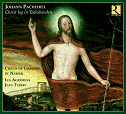 My
Discovery of the Month has to
be that Johann Pachelbel (1653-1706)
was not just a one-work composer. Ricercar,
spotting that the tercentenary of his
death in 2006 had gone unnoticed, have
recorded his cantatas Was Gott
tut, das ist wohlgetan, Christ
lag in Todesbanden and Jauchzet
dem Herrn, together with the
motet Gott ist unser Zuversicht
and some instrumental pieces, on RIC255,
available to download from eMusic.com.
The music is well worth hearing – you
wouldn’t rate it above Schütz or
Buxtehude, but it’s of more than historical
interest – not just as a bridge between
those better-known composers – and the
performances, by the Chœur de Chambre
de Namur and Les Agrémens
under Jean Tubéry, are
much more than adequate, as is the mp3
recording (most tracks are at well over
the magic 192k bit-rate).
My
Discovery of the Month has to
be that Johann Pachelbel (1653-1706)
was not just a one-work composer. Ricercar,
spotting that the tercentenary of his
death in 2006 had gone unnoticed, have
recorded his cantatas Was Gott
tut, das ist wohlgetan, Christ
lag in Todesbanden and Jauchzet
dem Herrn, together with the
motet Gott ist unser Zuversicht
and some instrumental pieces, on RIC255,
available to download from eMusic.com.
The music is well worth hearing – you
wouldn’t rate it above Schütz or
Buxtehude, but it’s of more than historical
interest – not just as a bridge between
those better-known composers – and the
performances, by the Chœur de Chambre
de Namur and Les Agrémens
under Jean Tubéry, are
much more than adequate, as is the mp3
recording (most tracks are at well over
the magic 192k bit-rate).
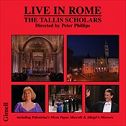 This
Pachelbel recording might have become
my Download of the Month, too,
but that honour has to go to the Tallis
Scholars. Last month I recommended
the download version of their Live
in Oxford recording. This month
I’m following that up with an even stronger
recommendation of their Live in Rome
recording, made in 1994, the year of
the quatercentenary of Palestrina’s
death (CDGIM994). The programme is mostly
Palestrina – Missa Papæ
Marcelli, Magnificat, Nunc
Dimittis and Stabat Mater
– with Allegri’s Miserere
as an added attraction. Carrying coals
to Newcastle this may be, but the result
is excellent. All that’s missing is
a pictorial record of the event, provided
by the DVD equivalent, which is on order
even as I write this – watch out for
a separate review in the main pages
of MusicWeb. In fact, when that review
appears, the DVD will also be a Recording
of the Month, echoing John France’s
award of that accolade when he reviewed
the recording in 2004 – see review.
This
Pachelbel recording might have become
my Download of the Month, too,
but that honour has to go to the Tallis
Scholars. Last month I recommended
the download version of their Live
in Oxford recording. This month
I’m following that up with an even stronger
recommendation of their Live in Rome
recording, made in 1994, the year of
the quatercentenary of Palestrina’s
death (CDGIM994). The programme is mostly
Palestrina – Missa Papæ
Marcelli, Magnificat, Nunc
Dimittis and Stabat Mater
– with Allegri’s Miserere
as an added attraction. Carrying coals
to Newcastle this may be, but the result
is excellent. All that’s missing is
a pictorial record of the event, provided
by the DVD equivalent, which is on order
even as I write this – watch out for
a separate review in the main pages
of MusicWeb. In fact, when that review
appears, the DVD will also be a Recording
of the Month, echoing John France’s
award of that accolade when he reviewed
the recording in 2004 – see review.
Don’t forget the Tallis Scholars’ recording
of Palestrina’s Masses Benedicta
es and Nasce la gioja mea
which I reviewed as a download some
time ago (GIMSE402 – see review)
a splendid bargain at £5.99 for the
mp3 or £6.99 for the lossless version.
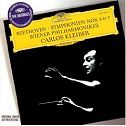 It’s
something of a fool’s errand to recommend
anything from Passionato.com as Bargain
of the Month, since the bargain
in question changes every day, but Carlos
Kleiber’s DG recording of Beethoven’s
Fifth and Seventh Symphonies with
the VPO in very decent 320k sound has
to be a real bargain for £2.99 – if
it returns, as some of the daily bargains
already have, snap it up. The Fifth
has been consistently praised since
it first appeared on LP, but the Seventh
is also a revelation – just about the
best version I’ve heard since Bruno
Walter’s mono version with the NYPO.
It’s
something of a fool’s errand to recommend
anything from Passionato.com as Bargain
of the Month, since the bargain
in question changes every day, but Carlos
Kleiber’s DG recording of Beethoven’s
Fifth and Seventh Symphonies with
the VPO in very decent 320k sound has
to be a real bargain for £2.99 – if
it returns, as some of the daily bargains
already have, snap it up. The Fifth
has been consistently praised since
it first appeared on LP, but the Seventh
is also a revelation – just about the
best version I’ve heard since Bruno
Walter’s mono version with the NYPO.
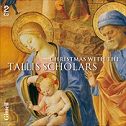 My
next few recommendations are of Christmas
music, commencing with a 2-CD set from
Gimell, Christmas with the Tallis
Scholars (CDGIM202), combining the
contents of two earlier CDs for the
price of one. The first CD contains
medieval carols, together with the Missa
Pastores quidnam vidistis of Clemens
non Papa and other later works by Josquin,
Victoria and Praetorius; the second
offers the Christmas Midnight Mass and
other chants from the medieval English
Sarum rite – a richer liturgy than the
Tridentine revision – from CDGIM017,
together with Tallis’s Missa Puer
natus est nobis. The Tallis Mass
makes this a generously-filled disc
– the two CDs together play for over
2½ hours – though serious collectors
may well already have this or another
version of the Tallis. The only other
small reservation concerns the fact
that not all of the Clemens CD, CDGIM013,
is included here – if you want the rest,
you’ll inevitably duplicate the Mass.
Continuing problems with my mobile broadband
made it impossible to download in the
lossless wma format but the 320k mp3
download is very acceptable. Knowing
of my broadband woes, Gimell kindly
supplied the CDs, too, for comparison.
In whichever format you choose, this
set may be strongly recommended. As
always with Gimell, the documentation
is excellent – and it’s all included
with the download.
My
next few recommendations are of Christmas
music, commencing with a 2-CD set from
Gimell, Christmas with the Tallis
Scholars (CDGIM202), combining the
contents of two earlier CDs for the
price of one. The first CD contains
medieval carols, together with the Missa
Pastores quidnam vidistis of Clemens
non Papa and other later works by Josquin,
Victoria and Praetorius; the second
offers the Christmas Midnight Mass and
other chants from the medieval English
Sarum rite – a richer liturgy than the
Tridentine revision – from CDGIM017,
together with Tallis’s Missa Puer
natus est nobis. The Tallis Mass
makes this a generously-filled disc
– the two CDs together play for over
2½ hours – though serious collectors
may well already have this or another
version of the Tallis. The only other
small reservation concerns the fact
that not all of the Clemens CD, CDGIM013,
is included here – if you want the rest,
you’ll inevitably duplicate the Mass.
Continuing problems with my mobile broadband
made it impossible to download in the
lossless wma format but the 320k mp3
download is very acceptable. Knowing
of my broadband woes, Gimell kindly
supplied the CDs, too, for comparison.
In whichever format you choose, this
set may be strongly recommended. As
always with Gimell, the documentation
is excellent – and it’s all included
with the download.
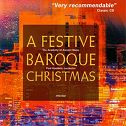 A
Festive Baroque Christmas moves
us on a century or so. This super-budget
recording (HCX395 7202) offers performances
by The Academy of Ancient Music/Paul
Goodwin mainly of vocal music by
Heinrich Schütz with instrumental
interpolations by his Venetian mentor,
Giovanni Gabrieli and the less
well-known Matthias Weckmann
and Francesco Usper. A delightful
collection, well worth 15 tracks from
eMusic or £4.74 from iTunes, the latter
at a very acceptable 256k. Like all
the recordings in the Harmonia Mundi
Classical Express series, the cover
is dull and unimaginative – why not
create your own from the wealth of artwork
available online?
A
Festive Baroque Christmas moves
us on a century or so. This super-budget
recording (HCX395 7202) offers performances
by The Academy of Ancient Music/Paul
Goodwin mainly of vocal music by
Heinrich Schütz with instrumental
interpolations by his Venetian mentor,
Giovanni Gabrieli and the less
well-known Matthias Weckmann
and Francesco Usper. A delightful
collection, well worth 15 tracks from
eMusic or £4.74 from iTunes, the latter
at a very acceptable 256k. Like all
the recordings in the Harmonia Mundi
Classical Express series, the cover
is dull and unimaginative – why not
create your own from the wealth of artwork
available online?
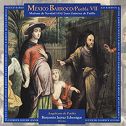 We
can date Juan Gutiérrez de
Padilla’s music for Christmas
Matins (Maitines de Navidad)
exactly to 1652. I recently recommended
a Coro recording of Padilla’s music
in a very different mood – Streams
of Tears, COR16059: see review
– but this CD offers a very happy experience
– nine Villancicos based on Mexican
folk music which would otherwise have
disappeared without record and a concluding
hymn, Christus natus est nobis.
It’s one of a series of Urtext recordings
made by Angelicum de Puebla,
a group of performers from the city
of that name, directed by Benjamin
Juárez Echenique. (UMA2011).
The singing is not as polished as that
of the AAM or the Tallis scholars –
or, indeed, the Sixteen on the Coro
recording – but that really doesn’t
matter. The mp3 sound (192k) is very
acceptable. The only possible impediment
to your enjoyment is the very short
playing time of 46 minutes. The eMusic
download will set you back the cost
of ten tracks.
We
can date Juan Gutiérrez de
Padilla’s music for Christmas
Matins (Maitines de Navidad)
exactly to 1652. I recently recommended
a Coro recording of Padilla’s music
in a very different mood – Streams
of Tears, COR16059: see review
– but this CD offers a very happy experience
– nine Villancicos based on Mexican
folk music which would otherwise have
disappeared without record and a concluding
hymn, Christus natus est nobis.
It’s one of a series of Urtext recordings
made by Angelicum de Puebla,
a group of performers from the city
of that name, directed by Benjamin
Juárez Echenique. (UMA2011).
The singing is not as polished as that
of the AAM or the Tallis scholars –
or, indeed, the Sixteen on the Coro
recording – but that really doesn’t
matter. The mp3 sound (192k) is very
acceptable. The only possible impediment
to your enjoyment is the very short
playing time of 46 minutes. The eMusic
download will set you back the cost
of ten tracks.
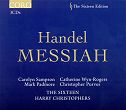 Last
month I gave a brief recommendation
to the new recording of Handel’s
Messiah (The Sixteen/Harry Christophers,
Coro COR16062) and promised to return
to this in order to deal with some minor
reservations. In the event, having listened
to this recording a number of times,
those reservations now appear so insignificant
as not to be worth mentioning. In particular,
I have listened carefully to Carolyn
Sampson, having seen one review which
made her contribution the weak point
of the enterprise; I disagree – I find
the purity of tone of her singing totally
convincing. This now joins the versions
of Trevor Pinnock and Paul McCreesh
(both DG) at the top of the list of
period performances, available from
classicsonline and theclassicalshop.
I hasten to add that I’m certainly not
ruling out John Butt’s version (Linn
CKD285) which has won so many golden
opinions – I just haven’t heard it;
it’s available to download from Linn’s
own website, linnrecords.com; the mp3,
wma and even the studio quality versions
are less expensive than the mp3 at classicsonline
– they seem to have forgotten that CD3
is supposed to be a bonus.
Last
month I gave a brief recommendation
to the new recording of Handel’s
Messiah (The Sixteen/Harry Christophers,
Coro COR16062) and promised to return
to this in order to deal with some minor
reservations. In the event, having listened
to this recording a number of times,
those reservations now appear so insignificant
as not to be worth mentioning. In particular,
I have listened carefully to Carolyn
Sampson, having seen one review which
made her contribution the weak point
of the enterprise; I disagree – I find
the purity of tone of her singing totally
convincing. This now joins the versions
of Trevor Pinnock and Paul McCreesh
(both DG) at the top of the list of
period performances, available from
classicsonline and theclassicalshop.
I hasten to add that I’m certainly not
ruling out John Butt’s version (Linn
CKD285) which has won so many golden
opinions – I just haven’t heard it;
it’s available to download from Linn’s
own website, linnrecords.com; the mp3,
wma and even the studio quality versions
are less expensive than the mp3 at classicsonline
– they seem to have forgotten that CD3
is supposed to be a bonus.
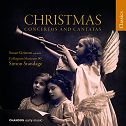 Christmas
Concertos and Cantatas with Collegium
Musicum 90/Simon Standage is virtually
self-recommending. There are concertos
by Manfredini and Vivaldi as well as
the Corelli Op.6/8, together with cantatas
by Alessandro Scarlatti and Telemann.
Make sure to go for the cheaper reissue
on CHAN0754 – though you may find the
original cover, available to download
even by non-purchasers, with Botticelli’s
Mystic Nativity, much more attractive
than that of the reissue. Available
in lossless format with the suffix W
or as an mp3; oddly, the lossless version
is offered more cheaply than the mp3.
I’ve pointed out the discrepancy to
Chandos, so it may well have been put
right by the time you read this.
Christmas
Concertos and Cantatas with Collegium
Musicum 90/Simon Standage is virtually
self-recommending. There are concertos
by Manfredini and Vivaldi as well as
the Corelli Op.6/8, together with cantatas
by Alessandro Scarlatti and Telemann.
Make sure to go for the cheaper reissue
on CHAN0754 – though you may find the
original cover, available to download
even by non-purchasers, with Botticelli’s
Mystic Nativity, much more attractive
than that of the reissue. Available
in lossless format with the suffix W
or as an mp3; oddly, the lossless version
is offered more cheaply than the mp3.
I’ve pointed out the discrepancy to
Chandos, so it may well have been put
right by the time you read this.
 There
are many other highly recommendable
recordings by Collegium Musicum 90
under Simon Standage on the Chandos
early music label, Chaconne, and available
online from their website, theclassicalshop.net.
If you’ve heard a reasonable cross-section
of the music of Vivaldi and would like
to experiment with some of his near-contemporaries,
their recording of Alessandro Marcello’s
six Violin Concertos, Op.6, known
as ‘La Cetra’, together with
an extra Concerto in B-flat, would be
a good place to start. This is still
available on the original catalogue
number, CHAN0563 – be warned that this
is more expensive than exactly the same
recordings under the reissued number,
CHAN0744 – one of the bizarre consequences
of Chandos’s otherwise highly laudable
practice of keeping deleted CDs available
online. The ‘La Cetra’ concertos are
also suitable for performance with the
oboe as solo instrument, in which form
they have been recorded by Heinz Holliger
(427 137-2 – but not listed on Universal’s
download site, classicsandjazz.co.uk)
though I prefer the violin versions,
especially when they are as well played
as on the Chandos recording. The music
may not be up to the high standard of
Vivaldi’s own ‘La Cetra’ (Op.9), but
it’s very attractive and the recording
very good – go for the lossless version
if possible.
There
are many other highly recommendable
recordings by Collegium Musicum 90
under Simon Standage on the Chandos
early music label, Chaconne, and available
online from their website, theclassicalshop.net.
If you’ve heard a reasonable cross-section
of the music of Vivaldi and would like
to experiment with some of his near-contemporaries,
their recording of Alessandro Marcello’s
six Violin Concertos, Op.6, known
as ‘La Cetra’, together with
an extra Concerto in B-flat, would be
a good place to start. This is still
available on the original catalogue
number, CHAN0563 – be warned that this
is more expensive than exactly the same
recordings under the reissued number,
CHAN0744 – one of the bizarre consequences
of Chandos’s otherwise highly laudable
practice of keeping deleted CDs available
online. The ‘La Cetra’ concertos are
also suitable for performance with the
oboe as solo instrument, in which form
they have been recorded by Heinz Holliger
(427 137-2 – but not listed on Universal’s
download site, classicsandjazz.co.uk)
though I prefer the violin versions,
especially when they are as well played
as on the Chandos recording. The music
may not be up to the high standard of
Vivaldi’s own ‘La Cetra’ (Op.9), but
it’s very attractive and the recording
very good – go for the lossless version
if possible.
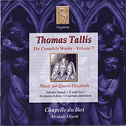 Last
month I recommended the first six volumes
of the Complete Works of Thomas Tallis,
performed by Chapelle du Roi
under Alistair Dixon. Volume
7 – Music for Queen Elizabeth (SIGCD029)
is probably the most desirable in the
whole series, with superb settings of
Salvator mundi, O nata lux,
In jejunio et fletu and O
sacrum convivium and concluding
with the masterpiece Spem in alium.
This would be the volume for beginners
to acquire first.
Last
month I recommended the first six volumes
of the Complete Works of Thomas Tallis,
performed by Chapelle du Roi
under Alistair Dixon. Volume
7 – Music for Queen Elizabeth (SIGCD029)
is probably the most desirable in the
whole series, with superb settings of
Salvator mundi, O nata lux,
In jejunio et fletu and O
sacrum convivium and concluding
with the masterpiece Spem in alium.
This would be the volume for beginners
to acquire first.
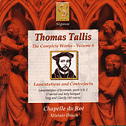 Volume 8 (SIGCD036) contains the two
settings of Lamentations and
the Contrafacta – Latin works
with new English texts, including the
English version of Spem in alium,
Sing and Glorify. Incidentally,
if it’s just Spem and its English
version that you want, these are available
on a short CD and as a download. Chapelle
du Roi are certainly not the only show
in town for the better-known pieces
such as Spem in alium, but they
offer very strong competition for the
likes of The Tallis Scholars and The
Sixteen and they are the only group
to offer the complete works.
Volume 8 (SIGCD036) contains the two
settings of Lamentations and
the Contrafacta – Latin works
with new English texts, including the
English version of Spem in alium,
Sing and Glorify. Incidentally,
if it’s just Spem and its English
version that you want, these are available
on a short CD and as a download. Chapelle
du Roi are certainly not the only show
in town for the better-known pieces
such as Spem in alium, but they
offer very strong competition for the
likes of The Tallis Scholars and The
Sixteen and they are the only group
to offer the complete works.
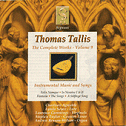 Volume
9 (SIGCD042) rounds off the series with
the least-known aspect of Tallis, his
instrumental music and songs, performed
by Charivari Agréable, Lynda
Sayce (lute), Lawrence Cummings (virginals
and harpsichord), Stephen Taylor (counter-tenor)
and Andrew Benson-Wilson (organ). A
short complimentary CD offers the English
Litany and three organ pieces.
Volume
9 (SIGCD042) rounds off the series with
the least-known aspect of Tallis, his
instrumental music and songs, performed
by Charivari Agréable, Lynda
Sayce (lute), Lawrence Cummings (virginals
and harpsichord), Stephen Taylor (counter-tenor)
and Andrew Benson-Wilson (organ). A
short complimentary CD offers the English
Litany and three organ pieces.
Classicsonline offer all nine volumes
at 320k for £7.99 each, including Volume
9; bizarrely, they also offer the short
Spem in alium CD for £7.99. eMusic
offer most of the volumes at around
192k, but the large number of tracks
involved would mean that your purchase
would have to be spread over several
months’ allocations, unless you just
want the two tracks on the short CD.
iTunes offer all the volumes in ‘plus’
format (256k) at £7.99 each except Volume
9 for which they charge double, £15.99,
though Signum offer the bonus disc free.
 Ian
Lace made the first volume of Karłowicz’s
Symphonic Poems (Naxos 8.570452,
Warsaw PO/Antoni Wit) his Recording
of the Month – see review
– and Rob Maynard was only a little
less enthusiastic – see review.
It’s a real download bargain from eMusic
– just three tracks of your monthly
allocation, less than £1, for 70 minutes
of solid enjoyment. The bit-rate, as
so often with eMusic, varies from track
to track, from an acceptable 195k to
a very acceptable 320k for the third
and longest work in the programme. You
can get the whole thing at 320k from
classicsonline, but at a higher price.
As usual, the notes – in this case by
Richard Whitehouse – are available to
cut and paste from the Naxos website.
You can get Volume 2 online, too – I’ll
try to get round to that next month.
Ian
Lace made the first volume of Karłowicz’s
Symphonic Poems (Naxos 8.570452,
Warsaw PO/Antoni Wit) his Recording
of the Month – see review
– and Rob Maynard was only a little
less enthusiastic – see review.
It’s a real download bargain from eMusic
– just three tracks of your monthly
allocation, less than £1, for 70 minutes
of solid enjoyment. The bit-rate, as
so often with eMusic, varies from track
to track, from an acceptable 195k to
a very acceptable 320k for the third
and longest work in the programme. You
can get the whole thing at 320k from
classicsonline, but at a higher price.
As usual, the notes – in this case by
Richard Whitehouse – are available to
cut and paste from the Naxos website.
You can get Volume 2 online, too – I’ll
try to get round to that next month.
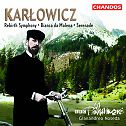 There
are rival versions of Karłowicz’s
music on Chandos. If you wish to try
these, CHAN10171 would be a good
place to start – it doesn’t involve
any overlap with the Naxos CD but contains
Bianca da Molena, the
Serenade for String Orchestra,
and the ‘Rebirth’ Symphony, Op.7.
IL preferred Naxos’s Warsaw performances
to the BBC Philharmonic under
Yan Pascal Tortelier on Chandos
but only by a small margin – why not
try both? I downloaded seven of the
nine tracks from Chandos’s home-base,
theclassicalshop.net and one each from
eMusic and iTunes. The classicalshop
tracks come at 320k, the iTunes at 256
and the track which I tried from eMusic
came at the lowest bit-rate but still
perfectly acceptable at 207k. Buying
the nine tracks from eMusic is the most
economical way to obtain this recording,
the download from theclassicalshop the
best guarantee of recording quality,
though I’m pleased to note that classicsonline.com
are now committed to offering all their
new releases in 320k versions. They’re
also uprating their back catalogue and
have promised to give customers who
have downloaded 192k versions access
to the improved product.
There
are rival versions of Karłowicz’s
music on Chandos. If you wish to try
these, CHAN10171 would be a good
place to start – it doesn’t involve
any overlap with the Naxos CD but contains
Bianca da Molena, the
Serenade for String Orchestra,
and the ‘Rebirth’ Symphony, Op.7.
IL preferred Naxos’s Warsaw performances
to the BBC Philharmonic under
Yan Pascal Tortelier on Chandos
but only by a small margin – why not
try both? I downloaded seven of the
nine tracks from Chandos’s home-base,
theclassicalshop.net and one each from
eMusic and iTunes. The classicalshop
tracks come at 320k, the iTunes at 256
and the track which I tried from eMusic
came at the lowest bit-rate but still
perfectly acceptable at 207k. Buying
the nine tracks from eMusic is the most
economical way to obtain this recording,
the download from theclassicalshop the
best guarantee of recording quality,
though I’m pleased to note that classicsonline.com
are now committed to offering all their
new releases in 320k versions. They’re
also uprating their back catalogue and
have promised to give customers who
have downloaded 192k versions access
to the improved product.
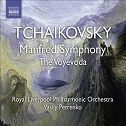 Naxos
already had a very decent 1988 recording
of Tchaikovsky’s Manfred Symphony
and The Voyevoda in their catalogue
(8.550224, CSR Symphony Orchestra/Ondrej
Lenard) but their new version of the
same coupling is far preferable (8.570568).
Here the Royal Liverpool Philharmonic
Orchestra, under Vasily Petrenko,
are back on the kind of form they used
to have years ago when Sir Charles Groves
was their principal conductor. Under
Petrenko’s direction, they offer a performance
which yet again makes me wonder why
this colourful and dramatic work was
not included in the canon of Tchaikovsky’s
symphonies. It’s available from eMusic,
whence I obtained it, in very acceptable
mp3 sound – most tracks at 210k – and
from classicsonline.
Naxos
already had a very decent 1988 recording
of Tchaikovsky’s Manfred Symphony
and The Voyevoda in their catalogue
(8.550224, CSR Symphony Orchestra/Ondrej
Lenard) but their new version of the
same coupling is far preferable (8.570568).
Here the Royal Liverpool Philharmonic
Orchestra, under Vasily Petrenko,
are back on the kind of form they used
to have years ago when Sir Charles Groves
was their principal conductor. Under
Petrenko’s direction, they offer a performance
which yet again makes me wonder why
this colourful and dramatic work was
not included in the canon of Tchaikovsky’s
symphonies. It’s available from eMusic,
whence I obtained it, in very acceptable
mp3 sound – most tracks at 210k – and
from classicsonline.
At a slightly higher price, you can
get this recording in 320k sound from
classicsonline.com or, if you want the
highly recommended Oslo PO/Jansons recording
on CHAN8535, you can download that from
its home base at theclassicalshop.net
in lossless or mp3 form, or from classicsonline,
or from eMusic – 4 tracks only, this
time; there’s no coupling).
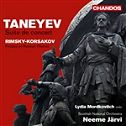 A
recent Chandos issue brings Taneyev’s
attractive Suite de Concert, Op.25
and Rimsky-Korsakov’s Fantasy on
Russian Themes, Op.33, very well
performed by Lydia Mordkovitch (violin)
and the Royal Scottish National Orchestra
with Neeme Järvi (CHAN10491).
It’s available in excellent lossless
sound and almost equally fine mp3 from
theclassicalshop.net – also from eMusic
and classicsonline in mp3. You’ll have
to type in Chandos’s mis-spelling, Tanayev,
in order to find this recording on their
website.
A
recent Chandos issue brings Taneyev’s
attractive Suite de Concert, Op.25
and Rimsky-Korsakov’s Fantasy on
Russian Themes, Op.33, very well
performed by Lydia Mordkovitch (violin)
and the Royal Scottish National Orchestra
with Neeme Järvi (CHAN10491).
It’s available in excellent lossless
sound and almost equally fine mp3 from
theclassicalshop.net – also from eMusic
and classicsonline in mp3. You’ll have
to type in Chandos’s mis-spelling, Tanayev,
in order to find this recording on their
website.
If the new issue moves you to explore
Taneyev further, Chandos also
have fine versions of his Symphonies
Nos. 1 and 3 (CHAN10390) and Nos.
2 and 4 (CHAN9998) with the Russian
State SO under Valeri Polyansky,
both available for download from their
theclassicalshop.net.
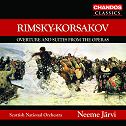 A
two-CD bargain from Chandos (CHAN10369(2)X)
also brings more Rimsky-Korsakov
– the Overture May Night, Suites
from Tsar Saltan, Mlada,
The Snow Maiden, The Invisible
City of Kitezh, The Golden Cockerel
and, most apposite at this time of year,
the magical suite from Christmas
Eve in very good performances, well
recorded, by the Royal Scottish National
Orchestra and Neeme Järvi.
I haven’t enjoyed these works by Rimsky
so much since the old OSR/Ansermet Decca
LPs. Once again the download sound is
good.
A
two-CD bargain from Chandos (CHAN10369(2)X)
also brings more Rimsky-Korsakov
– the Overture May Night, Suites
from Tsar Saltan, Mlada,
The Snow Maiden, The Invisible
City of Kitezh, The Golden Cockerel
and, most apposite at this time of year,
the magical suite from Christmas
Eve in very good performances, well
recorded, by the Royal Scottish National
Orchestra and Neeme Järvi.
I haven’t enjoyed these works by Rimsky
so much since the old OSR/Ansermet Decca
LPs. Once again the download sound is
good.
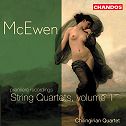 I’m
not at all sure how I came to download
Volume 1 of the String Quartets
of Sir John Blackwood McEwen
(1868-1948) from theclassicalshop but
there they were in my Musicweb Order
History in both mp3 (320k) and wma formats,
performed by the Chilingirian Quartet
(CHAN9926). The works in this volume
range in date from the Fourth Quartet
of 1905 via the Seventh (1916) and Sixteenth
(1936) to the Fantasia of 1947. I’m
going to need a little more time to
let the music grow on me, but first
impressions are very favourable. I tried
both audio formats and both are, as
usual with Chandos, very acceptable
indeed.
I’m
not at all sure how I came to download
Volume 1 of the String Quartets
of Sir John Blackwood McEwen
(1868-1948) from theclassicalshop but
there they were in my Musicweb Order
History in both mp3 (320k) and wma formats,
performed by the Chilingirian Quartet
(CHAN9926). The works in this volume
range in date from the Fourth Quartet
of 1905 via the Seventh (1916) and Sixteenth
(1936) to the Fantasia of 1947. I’m
going to need a little more time to
let the music grow on me, but first
impressions are very favourable. I tried
both audio formats and both are, as
usual with Chandos, very acceptable
indeed.
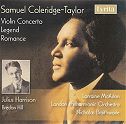 We’re
extremely fortunate to have three very
good recorded performances of Samuel
Taylor-Coleridge’s Violin Concerto.
Having been most impressed by Anthony
Marwood’s broadcast performance with
the CBSO, I had been intending for some
time to go for his Hyperion recording
but, having read Rob Barnett’s enthusiastic
review of Lorraine McAslan’s
Lyrita recording with the LPO
and Nicholas Braithwaite (SRCD.317
– see review),
I downloaded that version from eMusic
and was delighted to have made that
decision. Very strongly recommended
– in another month, I might well have
made this my Download of the Month (it
was RB’s Recording of the Month). The
couplings are also excellent, especially
Julius Harrison’s Bredon Hill
(which, incidentally, is one of the
many place names which mean ‘hill-hill-hill’).
We’re
extremely fortunate to have three very
good recorded performances of Samuel
Taylor-Coleridge’s Violin Concerto.
Having been most impressed by Anthony
Marwood’s broadcast performance with
the CBSO, I had been intending for some
time to go for his Hyperion recording
but, having read Rob Barnett’s enthusiastic
review of Lorraine McAslan’s
Lyrita recording with the LPO
and Nicholas Braithwaite (SRCD.317
– see review),
I downloaded that version from eMusic
and was delighted to have made that
decision. Very strongly recommended
– in another month, I might well have
made this my Download of the Month (it
was RB’s Recording of the Month). The
couplings are also excellent, especially
Julius Harrison’s Bredon Hill
(which, incidentally, is one of the
many place names which mean ‘hill-hill-hill’).
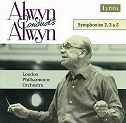 Another
Lyrita recording which I am very pleased
to have downloaded from eMusic comes
in the Alwyn Conducts Alwyn series,
from which I already possessed the recording
of the First and Fourth Symphonies when
they were briefly available on CD in
the 1990s. Symphonies 2, 3 and 5
are every bit as fine as those on
the earlier disc and the recordings
of all the Lyritas which I have downloaded
from eMusic have all been of good quality,
albeit that most tracks on both these
recording fall slightly short of the
magic 192k. As Colin Clark writes in
his review
of the CD (SRCD.228), the symphonies
represent the more serious side of Alwyn,
but the music is always approachable.
Strongly recommended.
Another
Lyrita recording which I am very pleased
to have downloaded from eMusic comes
in the Alwyn Conducts Alwyn series,
from which I already possessed the recording
of the First and Fourth Symphonies when
they were briefly available on CD in
the 1990s. Symphonies 2, 3 and 5
are every bit as fine as those on
the earlier disc and the recordings
of all the Lyritas which I have downloaded
from eMusic have all been of good quality,
albeit that most tracks on both these
recording fall slightly short of the
magic 192k. As Colin Clark writes in
his review
of the CD (SRCD.228), the symphonies
represent the more serious side of Alwyn,
but the music is always approachable.
Strongly recommended.
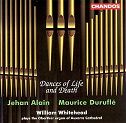 There
is a danger that the Messiaen centenary
may obscure the achievements of other
French 20th-century organ
composers. As an antidote – not that
I am other than pleased to see Messiaen
receive his due – I recommend William
Whitehead’s performances of some
of the music of Jehan Alain and
Maurice Duruflé on the
organ of Auxerre Cathedral (Dances
of Life and Death, Chandos CHAN01315
– see Graham Mark Scott’s review),
available from theclassicalshop.net
in lossless and mp3 sound. I would recommend
laying out the extra for the lossless
version of a recording which does justice
to the sound of the instrument in first-class
performances.
There
is a danger that the Messiaen centenary
may obscure the achievements of other
French 20th-century organ
composers. As an antidote – not that
I am other than pleased to see Messiaen
receive his due – I recommend William
Whitehead’s performances of some
of the music of Jehan Alain and
Maurice Duruflé on the
organ of Auxerre Cathedral (Dances
of Life and Death, Chandos CHAN01315
– see Graham Mark Scott’s review),
available from theclassicalshop.net
in lossless and mp3 sound. I would recommend
laying out the extra for the lossless
version of a recording which does justice
to the sound of the instrument in first-class
performances.
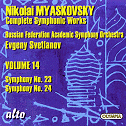 It
hardly seems possible that Nikolai
Myaskovsky was a contemporary of
Shostakovich and Prokofiev – his music
sounds more like what Rimsky-Korsakov
might have written had he lived into
the mid-twentieth-century. Evgeny
Svetlanov’s 16-CD box set of his
symphonies (Warner Classics) has just
won an award, but Olympia, the original
begetters of this series, are also licensing
individual discs to Alto, who are issuing
them at super-budget price. Several
of them are also available from eMusic,
from whom I downloaded the contents
of Volume 14 (ALC1024), containing Symphonies
23, Op.56 (1941) and 24,
Op.63 (1943). The playing is
a little rough-and-ready in places –
the odd fluffed note and lack of co-ordinated
ensemble – but the heart of the Russian
Federation Academic Symphony Orchestra
– and, even more importantly, that of
Svetlanov – is truly sympathetic to
the music. With decent recording (all
tracks at over 192k) this may be recommended
to anyone who started to collect the
Olympia series before the demise of
that label. (The cover even perpetuates
the Olympia name). iTunes offer several
recordings from this series but, at
£7.99 each, they are almost twice the
price at which some dealers offer the
CDs. The iTunes price for the complete
Warner box is much more attractive,
working out at less than £2 per disc.
It
hardly seems possible that Nikolai
Myaskovsky was a contemporary of
Shostakovich and Prokofiev – his music
sounds more like what Rimsky-Korsakov
might have written had he lived into
the mid-twentieth-century. Evgeny
Svetlanov’s 16-CD box set of his
symphonies (Warner Classics) has just
won an award, but Olympia, the original
begetters of this series, are also licensing
individual discs to Alto, who are issuing
them at super-budget price. Several
of them are also available from eMusic,
from whom I downloaded the contents
of Volume 14 (ALC1024), containing Symphonies
23, Op.56 (1941) and 24,
Op.63 (1943). The playing is
a little rough-and-ready in places –
the odd fluffed note and lack of co-ordinated
ensemble – but the heart of the Russian
Federation Academic Symphony Orchestra
– and, even more importantly, that of
Svetlanov – is truly sympathetic to
the music. With decent recording (all
tracks at over 192k) this may be recommended
to anyone who started to collect the
Olympia series before the demise of
that label. (The cover even perpetuates
the Olympia name). iTunes offer several
recordings from this series but, at
£7.99 each, they are almost twice the
price at which some dealers offer the
CDs. The iTunes price for the complete
Warner box is much more attractive,
working out at less than £2 per disc.
Some of the earlier discs in the Olympia
series offered performances by the USSR
Radio Symphony Orchestra/Konstantin
Ivanov and the Moscow Symphony Orchestra/Veronika
Dudarova – not bad, but the Svetlanov
replacements are better and better recorded
– the Melodiya/Olympia sound was rather
thick at climaxes. I played OCD133,
Symphonies 5 and 11, immediately after
hearing the Alto download and can confirm
the superiority of the newer recording.
Some of these earlier Olympia recordings
have been released on another super-budget
label, Regis – see, for example, Rob
Barnett’s review
of RRC1244.
I compared the download of Volume 14
with the physical CD of Volume 13 (ALC0123,
Symphonies 17 and 21) and, apart
from the notes which come with the latter
– surprisingly full for a super-budget
release – found the quality to be comparable.
Volume 13 is also available to download
from eMusic and some may prefer it,
since Symphony No.21 is often considered
to be his best orchestral work. (See
Rob Barnett’s enthusiastic review
of the CD.)
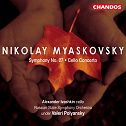 If
you’re looking for Myaskovsky
in refined sound, Chandos have a recording
of his 27th Symphony,
Op.85, his final symphony, coupled with
the Cello Concerto, Op.66, available
on CD and as a 320k mp3 download or
in lossless format (Alexander Ivashkin
(cello) with the Russian State Symphony
Orchestra/Valeri Polyansky, CHAN10025
– see RB’s review
of the CD). This is available from theclassicalshop.net
(mp3 at 320k and lossless versions)
and eMusic (mp3 only). I sampled the
second movement of the symphony from
eMusic (at the unlikely bit-rate of
203k) and the remaining four tracks
as mp3s from theclassicalshop. Performance
and recording leave very little to be
desired and both the eMusic and classicalshop
mp3s sound fine.
If
you’re looking for Myaskovsky
in refined sound, Chandos have a recording
of his 27th Symphony,
Op.85, his final symphony, coupled with
the Cello Concerto, Op.66, available
on CD and as a 320k mp3 download or
in lossless format (Alexander Ivashkin
(cello) with the Russian State Symphony
Orchestra/Valeri Polyansky, CHAN10025
– see RB’s review
of the CD). This is available from theclassicalshop.net
(mp3 at 320k and lossless versions)
and eMusic (mp3 only). I sampled the
second movement of the symphony from
eMusic (at the unlikely bit-rate of
203k) and the remaining four tracks
as mp3s from theclassicalshop. Performance
and recording leave very little to be
desired and both the eMusic and classicalshop
mp3s sound fine.
You may have noticed that Chandos have
recently re-coupled some of their Prokofiev
recordings and reissued them at lower
prices: Alexander Nevsky on CHAN10482X,
Four Portraits from The Gambler
on CHAN10485X, Lieutenant Kijé
on CHAN10481X, Peter and the Wolf
on CHAN10484X, The Prodigal Son
on CHAN10486X and Chout (‘The
Buffoon’) on CHAN10483X. All are conducted
by Neeme Järvi and all are recommendable.
I plan to review their download equivalents
in coming roundups, but I also want
to recommend Järvi’s performances
of the symphonies. His version of the
Sixth Symphony (CHAN8359) is
the best I have heard of that elusive
symphony since the Leinsdorf version
on RCA, a splendid performance rather
spoiled by the ‘Dynagroove’ recording
technique.
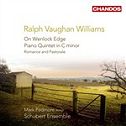
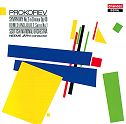
 Järvi’s
account of the Second Symphony
is also excellent – it comes about as
close as any performance ever has to
persuading me to like the work. You
may not want the Romeo and Juliet
Suite No.1 which accompanies the
second – you may well have another recording
– or the rather lightweight excerpts
from the Waltz Suite which accompany
the sixth, so you may like to note that
the two symphonies actually fit on one
CD at 74:40. The best downloads of all
these Chandos Prokofiev recordings come,
of course, from their own site, theclassicalshop.net,
but if you are planning to mix and match
the two symphonies, the most inexpensive
way to do so is by purchasing the eight
tracks of the second and the three of
the sixth from eMusic. (In fact, Chandos
have now reissued all the Prokofiev
symphonies on CD as a 4-disc box set
at super-budget price – more next month.)
Järvi’s
account of the Second Symphony
is also excellent – it comes about as
close as any performance ever has to
persuading me to like the work. You
may not want the Romeo and Juliet
Suite No.1 which accompanies the
second – you may well have another recording
– or the rather lightweight excerpts
from the Waltz Suite which accompany
the sixth, so you may like to note that
the two symphonies actually fit on one
CD at 74:40. The best downloads of all
these Chandos Prokofiev recordings come,
of course, from their own site, theclassicalshop.net,
but if you are planning to mix and match
the two symphonies, the most inexpensive
way to do so is by purchasing the eight
tracks of the second and the three of
the sixth from eMusic. (In fact, Chandos
have now reissued all the Prokofiev
symphonies on CD as a 4-disc box set
at super-budget price – more next month.)
Rather belatedly, since I downloaded
it some considerable time ago, let me
recommend Mark Padmore and the
Schubert Ensemble in Vaughan
Williams – On Wenlock Edge
and the Piano Quintet in c. (CHAN10465)
I can recommend this recording with
all the more authority because I paid
to download it myself.

 Returning
finally to the festive theme, let me
thoroughly recommend Naxos’s Leroy
Anderson Sleigh Ride and other Holiday
Favourites (8.559621, BBCSO/Leonard
Slatkin). As well as Sleigh Ride,
this offers A Christmas Festival
and all versions of the Suite of
Carols. Excellent fun on 16 tracks
from eMusic at around 192k or in 320k
format from Passionato or classicsonline.
Some of the tracks appear on other volumes
in Naxos’s ongoing series of Anderson’s
music, which is slightly annoying –
the only way in which this enjoyable
recording is likely to raise any of
your hackles. The CD version of this
coupling is available only in North
America.
Returning
finally to the festive theme, let me
thoroughly recommend Naxos’s Leroy
Anderson Sleigh Ride and other Holiday
Favourites (8.559621, BBCSO/Leonard
Slatkin). As well as Sleigh Ride,
this offers A Christmas Festival
and all versions of the Suite of
Carols. Excellent fun on 16 tracks
from eMusic at around 192k or in 320k
format from Passionato or classicsonline.
Some of the tracks appear on other volumes
in Naxos’s ongoing series of Anderson’s
music, which is slightly annoying –
the only way in which this enjoyable
recording is likely to raise any of
your hackles. The CD version of this
coupling is available only in North
America.
Brian Wilson




 All Nimbus reviews
All Nimbus reviews








